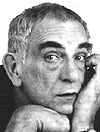"Live carefully, with your eyes open, and try not to cause pain."
Krzysztof Kieslowski (b. June 27, 1941 in Warsaw, Poland -- d. March 13, 1996) was a leading director of documentaries, television and feature films from the 1970s to the 1990s. The social and moral themes of contemporary times became the focus of his many significant films and his unique humanist treatment of those themes secured his place as one of the greatest of modern film directors. He was a prominent member of the Polish film generation who defined the so-called "Cinema of Moral Anxiety" - films which tested the limits of Socialist film censorship by drawing sharp contrasts between the individual and the state.
Kieslowski graduated from the Lodz Film School in 1968 and began his film career making documentaries that were both artistic and political and aimed to awaken social consciousness. Workers '71 attempted to relate the workers' state of mind as they organized strikes. The people's desire for more radical change was addressed in Talking Heads. In 1973, social and political commentary infused The Bricklayer, the story of a political activist who becomes disenchanted with the hierarchy surrounding Party politics, and returns to bricklaying. Kieslowski's documentary Hospital (1976) is both a homage to the hardworking surgeons in a Polish hospital, and a revealing look at the problems with health care in Poland.
His early feature films were made for television; they include Personnel and Calm. Because his feature films evolved from the documentaries, he continued to use documentary techniques to enhance and add realism to the fiction films. The Scar (1976) was Kieslowski's first theatrical release, a socio-realist view of management problems in a large industrial factory. He came to festival attention with Camera Buff (1979), a parody on the film industry, an exploration of the unknown and a wry commentary on censorship. Blind Chance, a 1981 feature film, concentrates on what role fate or chance plays in our futures.
In 1984, he began a longtime writing collaboration with Polish lawyer, Krzysztof Piesiewicz with No End. Set during Poland's martial law of 1982, it is the story of a dead lawyer who watches over his family as they continue on with their lives. His wife becomes involved in his last case involving a worker who had been arrested when he tried to organize a strike.
Kieslowski's mammoth Decalogue, co-written with Piesiewicz, is a series made for Polish television based on the Ten Commandments. Each episode is set in a contemporary apartment complex in Warsaw and is one hour long. Kieslowski tackled the project after feeling "tension, a feeling of hopelessness, and a fear of worse yet to come - everywhere, everything, practically everybody's life." The series was shown in its entirety as the centerpiece of the 1989 Venice Film Festival and is considered a masterpiece of modern cinema.
Lack of funds in Poland drove Kieslowski to seek financial backing from the West - most notably in France. The Double Life of Veronique (1992) firmly established Kieslowski with an international reputation. This moody, atmospheric study of two women, doppelgangers, one French, one Polish, who share the same name, birthday, heart condition, and a vague sense of the existence of the other, was a commercial as well as critical success and made a star of its leading actress, Irene Jacob.
The Three Colors trilogy, representing the colors of the French flag, Blue (1993, liberty), White (1994, equality) and Red (1994, fraternity) followed. The trilogy explores these three themes; in Blue, Juliette Binoche grieves as she loses her husband and child in a car accident and her new life and freedom cannot replace lost love. In White, a Polish hairdresser tries to regain the love of his ex-wife, a beautiful French girl played by Julie Delpy, and seeks equality in their one-sided relationship. In Red, Irene Jacob is a model who gradually falls in love with an older man (played by Jean-Louis Trintignant) after she accidentally kills his dog in a traffic accident. The retired judge arranges for her to "accidentally" meet someone her own age and for whom he thinks will be good for her. The films were scheduled to be released three months apart and while each can stand on its own; they were designed to be seen as a single entity.
Kieslowski periodically announced his retirement from filmmaking, though he never actually abandoned the cinema completely. His last project was to coauthor another trilogy with Piesiewicz, with the films tentatively titled Heaven, Hell, and Purgatory. Kieslowski died before the trilogy was completed. A chain smoker, the great director died following cardiac surgery at the age of 54.
Facets
